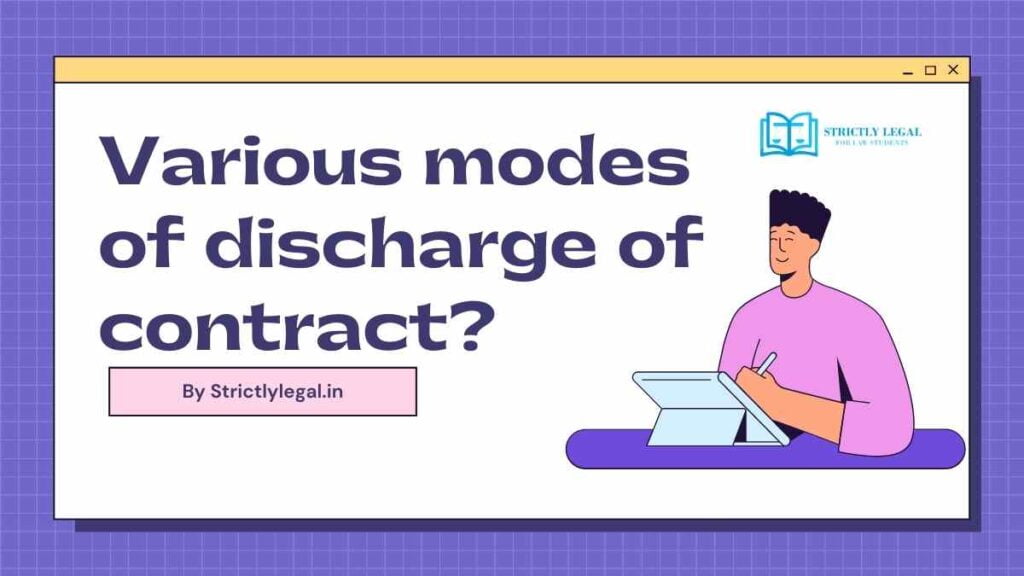This article deals with the meaning and modes of discharge of contract.
Firstly, let us understand, What is the meaning of discharge of contract?
A contract is said to be discharged when it ceases to bind the parties thereto. The discharge may be effected by the parties themselves in various ways. For example, the parties may either expressly or impliedly agree that a contract is discharged. The parties may also discharge a contract by their conduct. We shall discuss about these in detail:
Express Discharge– This type of discharge is effected by an express agreement between the parties that a contract is discharged. In other words, the parties express their will that a particular contract is discharged and this intention should be clear and unambiguous. For instance, if A contracts with B for the sale of certain goods at Rs. 100 per piece, but later both of them agree that they have cancelled the contract and there was no binding force on them to sell or buy anything, then such cancellation is a discharge by an express agreement.
Discharge By Conduct – This type of discharge occurs where a party to a particular contract clearly indicates his intention not to be bound by it, but such indication must be clear and unambiguous with their conduct.
Important: Best Books for Law of Contract
Table of Contents
Various Modes of Discharge of Contract?
In a contract, discharge occurs when one of the parties is released from the obligation to perform his side of the bargain. There are several modes of discharge of contract.
By performance
To discharge a contract by performance means to fulfill the obligations that the parties have undertaken in the contract. Sometimes it is referred to as discharge by ‘actual performance’. It is helpful to have a clear understanding of what is meant by the term performance. Performance, in law, is the act or an instance of doing what is required by a promise or duty.
Common examples of discharge by performance are: 1. The customer pays for goods and receives them from the shopkeeper; 2. The bank loans money to X who repays it back to the bank; and 3. A tenant pays his rent regularly for many years and continues paying it even after he has vacated the premises, as long as no one else has come into possession of it.
By operation of law
It may be said to be a form of discharge by operation of law which occurs when the terms of a contract are fulfilled by either party and such fulfillment automatically discharges one or more parties to the contract.
Discharge by operation of law may be held in following cases:
(i)A minor comes of age
(ii)A person becomes insane
(iii)An infant marries
(iv)A life insurance policy matures which assured payment on death
(v)Death Of The Party To The Contract.
Discharge by agreement or consent
It may be said to be a type of discharge which occurs when parties to a contract mutually agree that one or more parties should be discharged from their obligations without any change in the terms and conditions of the contract itself.
Discharge by Agreement can be explained in the following example: At the time when the parties enter into an agreement, they mutually agree that certain terms and conditions should no longer apply to either party after a specified date or during a specified period. Or for example, when both parties consent to discharge a contract on payment of compensation to the other party for loss or damage caused to him as a result of breach of contract.
Discharge by Subsequent Impossibility
Subsequent impossibility means an event which takes place after the contract and which makes it physically or commercially impossible for one party to carry out his side of the contract.
Discharge by Lapse of time
The time stipulated in a contract is called as the period of time fixed for the performance of a particular act under a contract, if such act is not performed within that period of time, then the contract becomes discharged due to lapse of time or because of delay in performance.
Alteration
When one party by altering the terms of a contract has agreed to discharge it, he will have discharged his liability under the old contract and will be liable only under the new modified contract. It must be noted that such alteration must be express or implied but not inferred.
Novation
When one of the parties substitutes another person in his place and binds himself with an original party to discharge him, it is called novation.
In other words, A novation is an effective discharge of an existing obligation by a subsequent substitution of another person or persons to be bound by it. For example, the substitution of one creditor for another by way of a novation is not permitted as it amounts to discharge by agreement. But where there is no direct substitution but only an indirect substitution like where an earlier creditor agrees to take less for his debt in lieu of releasing the debtor from his liability, such discharge does not amount to discharge by agreement and is not therefore void under Section 19 of the Indian Contract Act 1872.
(The difference between Alteration and Novation has been dealt separately. )
Conclusion
That concludes the topic on discharge of contract. If you’re interested in Contract law you should definitely check out out 101 Basics of Contract Drafting for Beginners! where we have covered the fundamental contract drafting principles.

Passionate about using the law to make a difference in people’s lives. An Advocate by profession.





